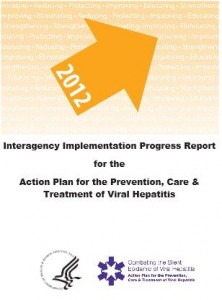Viral Hepatitis Action Plan 2012 Progress Report Released
 Dr. Ronald Valdiserri
Dr. Ronald ValdiserriIn a new report, partners from across the U.S. government have shared an update on progress made during 2012 in implementing the Action Plan for the Prevention, Care and Treatment of Viral Hepatitis. This is our second such progress report; a report on the first year of implementing the Action Plan was published last October.
Released in May 2011, the Action Plan details goals, strategies, and actions to be undertaken by federal agencies and offices between 2011-2013 to improve viral hepatitis prevention, care and treatment in the United States. During 2012, implementation of the Action Plan continued with significant activities that span the Operating and Staff Divisions across the Department of Health and Human Services as well as efforts undertaken by our federal partners at the Department of Justice’s Federal Bureau of Prisons and the Department of Veterans Affairs’ Veterans Health Administration.
 The 2012 progress report highlights a selection of key actions supporting the goals of the Action Plan in addition to a brief analysis of hepatitis B virus (HBV) and hepatitis C virus (HCV) testing activities taking place in federally funded programs. This compilation of viral hepatitis testing data marks an initial effort to collect and analyze testing activities supported by federal agencies. Of note, the report also features a listing of articles published in the peer-reviewed literature as well as reports and other technical documents produced in 2012 by various federal partners. Adding to our knowledge of viral hepatitis prevention, care and treatment is another important way that we can move closer toward achieving the goals of the Action Plan.
The 2012 progress report highlights a selection of key actions supporting the goals of the Action Plan in addition to a brief analysis of hepatitis B virus (HBV) and hepatitis C virus (HCV) testing activities taking place in federally funded programs. This compilation of viral hepatitis testing data marks an initial effort to collect and analyze testing activities supported by federal agencies. Of note, the report also features a listing of articles published in the peer-reviewed literature as well as reports and other technical documents produced in 2012 by various federal partners. Adding to our knowledge of viral hepatitis prevention, care and treatment is another important way that we can move closer toward achieving the goals of the Action Plan.
As we continue to implement the Action Plan, our federal partners are hard at work developing a three-year renewal of the plan that will articulate priorities and actions for 2014-2016. In his preface to the 2012 progress report, Assistant Secretary of Health Dr. Howard Koh observes, “Renewing the Action Plan will sustain our momentum while enabling us to strengthen our cross-agency collaborations, sharpen the focus of our activities, and expand the reach of our programs. This report of our 2012 progress will inform the renewal of the Action Plan along with public comments and expert input obtained from across the federal government and many committed stakeholders.”
While the focus of the 2012 report is federal, we recognize that achieving the goals of the Action Plan will require strong support from state and local governments, community organizations, advocacy groups, professional organizations, and the private sector, among others. And we are aware of and grateful for the many important contributions of these partners. In fact, in conversations around the renewal of the Viral Hepatitis Action Plan (2014-2016), we heard clearly that there was a need to make the renewed Action Plan more accessible to non-federal partners whose contributions are critical.
What have been highlights of your efforts to help break the silence around viral hepatitis and achieve the goals of the Action Plan?